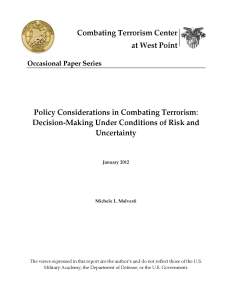The Combating Terrorism Center (CTC) at West Point is pleased to announce a new release as part of its Occasional Paper Series entitled “Policy Considerations in Combating Terrorism: Decision-Making Under Conditions of Risk and Uncertainty,” by CTC Senior Fellow Michele L. Malvesti.
This paper examines six issues that presidents and their national security teams often consider as they contemplate the use of Special Operations and covert action in combating terrorism: confidence in the intelligence, challenges of sovereignty, casualty sensitivity, assessments of effectiveness, comfort with the operational units and pressures to take action. These six considerations will continue to affect many U.S. decisions aimed at disrupting acts of terror and defeating terrorist organizations for years to come. As they weigh these issues, it is reasonable and prudent for decision-makers to consider the negative consequences associated with the failure of risky operations. There are equally important implications associated with not taking action against the nation’s terrorist enemies when the United States is capable of doing so with probable success. In the end, presidents and their advisers must remain open to calculated risks that can help to disrupt an act of terrorism, deal a decisive blow against a terrorist organization or otherwise produce a strategic outcome in service to the nation.
 Skip to content
Skip to content

